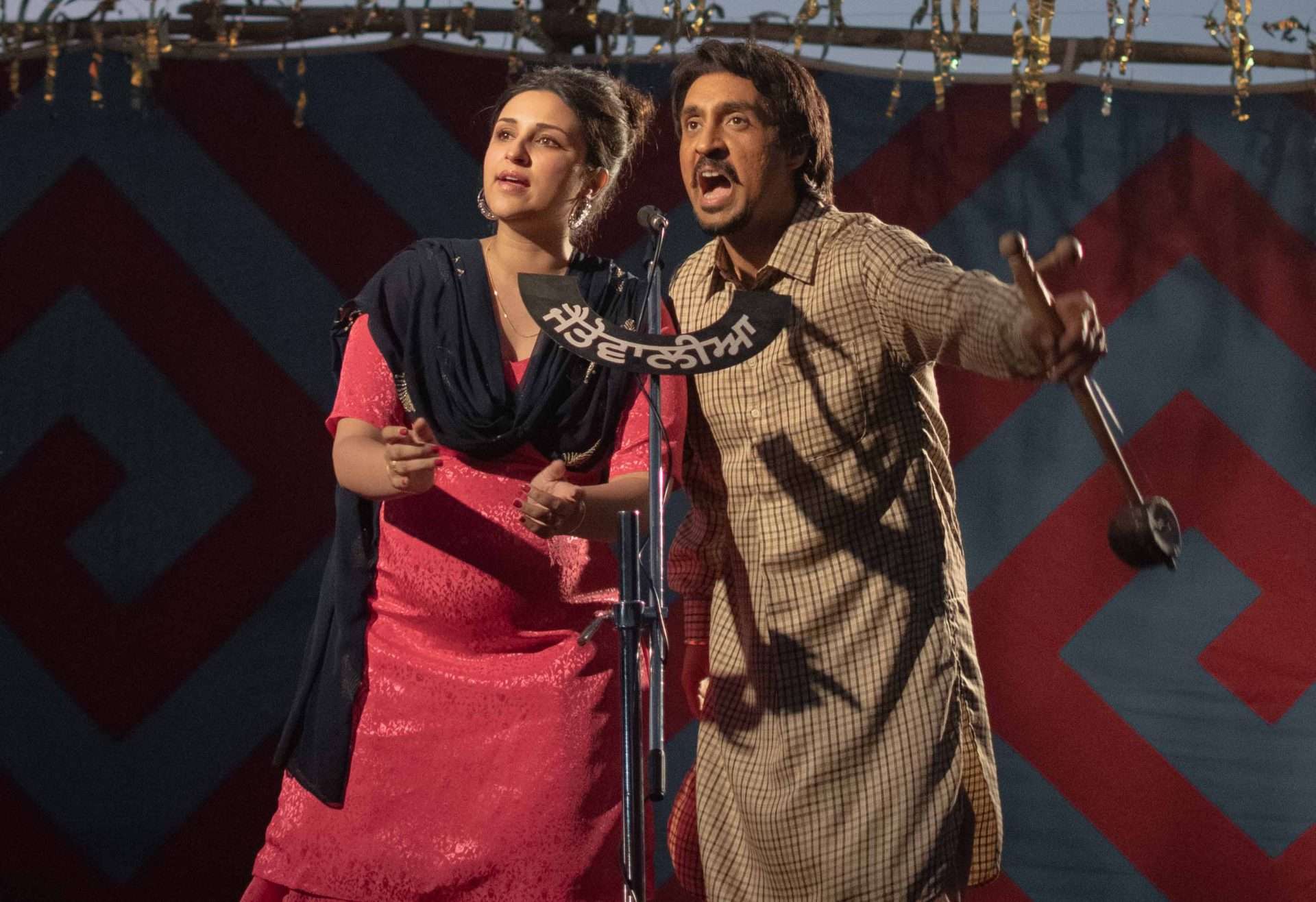Imtiaz Ali’s Amar Singh Chamkila is flanked by an instantly compelling subject. Chamkila, the most ragingly famous singer-lyricist to have come out of Punjab, is at the forefront of this biopic that unfolds in a linear manner, barring a few supposedly experimental techniques used to recall the myth of the man. Opening with the shock of the assassination of him (Diljit Dosanjh, sincere and gentle) and his wife, Amarjot (Parineeti Chopra), in 1988 before a performance at an akhara, the film proceeds to reveal a troubled history and society that had a conflicted, contradictory relationship and attitude towards Chamkila.
The indubitable triumph of the film is in its soundtrack, which is full of joy and resounding vitality. Chamkila’s songs energized and charged the state’s public amidst the terrible, unpredictable, bloody bleakness of their lives and times. Along with the actors doing their own renditions of the duo’s songs, Irshad Kamil’s biting lyrics take on the legend’s reputation as well as serve its own crackling, peppy riposte to all the censure that swirled around him. In the delicious, dazzling Naram Kaalja musical sequence, girls and women ecstatically reclaim Chamkila’s songs and its giddying celebration of their bodies and pleasure.
Yet, Punjab’s relationship with its icon was fraught with blatant hypocrisy. Chamkila was aware of the massive influence he wielded. While he manipulated it to suit his will during a crisis, he wasn’t oblivious to its inevitably limited time window. Therefore, he was driven by a basic survival instinct. Knowing he didn’t have a lot of time at his disposal and that anyway those who incite hate will pretty much take offense at anything, he chose to blaze through it all, even if the spell was brief.
The screenplay, which Ali has co-written with Sajid Ali, often comes off as visibly uppity in crunching together events of an entire life, despite its shortness. The old, too-familiar curse of the biopic strikes. As the film races through the dizzyingly, instantly meteoric rise to fame from the very moment he gets the stage to himself, the otherwise incredibly fascinating character starts to register in broad strokes. His approach to making the music he does and the lyrics he writes is simple.
He wrote from what the daily scenes he observed, especially including stuff he happened to eavesdrop. He chose not to filter out the supposed crass and lurid, instead focalizing them as the essential pull of his songs. Once he discovered their immediate, popular appeal, he clung to it, churning out songs that he knew would attract an eager, hungry audience. His blinding adulation for the public, through whose support he is able to wholly turn around his life and refashion his lower-caste identity, ultimately became his fatal undoing. As someone remarks while recounting, despite his stardom, he kept being servile to his audience.

Amar Singh Chamkila struts ahead frantically in ways that echo its protagonist’s desperate drive to hold onto his enormous public attention, even if he courted death threats for it. He seemed insecure and anxious about losing his spot in the sun if he dared to stray from the popular mandate. Despite being reassured that no artist in the state has ever had such fame, his neediness trumped rational considerations. Warnings were bandied out to him with a frequency that matched his likelihood to score a hit with every new song. But he was also firm and stood his ground.
However, the characterization is decidedly thin. As the crucial other half of the duo, Amarjot barely registers. The frame narrative of police officers attempting to unpack the artist’s life, which serves as the springboard for extended flashbacks into various chapters and periods constituting the bulk of the film, is entirely shallow and superfluous. It adds nothing to the film, existing merely as the thrust to memories of Chamkila recounted by friends and ex-associates.
While these are obvious attempts at capturing contesting perspectives about the slain artist, they veer close to being excessively concerted. Chamkila’s music constantly sparked controversy while remaining at the pinnacle both commercially as well as being inseparable from every other home and occasion in Punjab or ‘Panjab’, as the film puts it. To strum together the roving, wild force of Chamkila’s skyrocketing fame set against deeply tumultuous times, Ali inserts freely interrupting bursts of animated, graphic sketches, snippets of archival footage, and old pictures of the couple. However, this scattershot style tends to border on the flashily synthetic instead of being truly and defiantly playful like the grain of Chamkila’s bawdily worded music. A scene where he is interviewed by a journalist who attacks him for objectifying women in his songs also registers as painfully affected.
What’s gratingly missing is the broader socio-political space within which Chamkila exercised his artistic rights in a language that was cheerfully, heedlessly abrasive, delighting in its pure, unfettered expression. Chamkila made enemies on both sides, alienating his own community of competing musicians who struggled to stay afloat as he tried to grab every possible show.
Militants, fundamentalists, and the police – he was under everyone’s close watch. Instead of being daunted into mute submission, he refused to clamp down on the provocation of his songs that all exulted in while simultaneously denouncing for bringing disgrace to Punjab. Therefore, there are many fault lines. Content to play out in broad strokes, Amar Singh Chamkila never manages to effectively and specifically trace the mind-boggling complexity of the high-stakes situations the duo navigated, which only further strengthened their resistance.
Read More: Everything Coming To Netflix In April 2024
Amar Singh Chamkila (2024) Movie Links: IMDb, Wikipedia
Amar Singh Chamkila (2024) Movie Cast: Diljit Dosanjh, Parineeti Chopra, Apinderdeep Singh




![I, Daniel Blake [2016]: A Poignant Social-Realist Drama](http://www.highonfilms.com/wp-content/uploads/2017/02/I-Daniel-Blake-cover-768x468.jpg)
![Stupid Young Heart [2019] ‘IFFI’ Review- A Surprisingly Mature Take on the Immaturity](http://www.highonfilms.com/wp-content/uploads/2019/12/stupid_young_heart_still_1-768x433.jpg)


